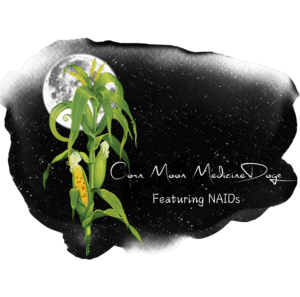What is a Medicine Dog?
What is a
Native American Indian
Medicine Dog?
Among the Southeastern Indian tribes, such as the Choctaw, Chickasaw, Creek, and Cherokee, dogs were never just dogs. They were guardians, watchers, spiritual protectors — family. And among these, some were born different: set apart not by appearance or skill, but by purpose. These were the medicine dogs.
In our traditional culture, medicine is not just a treatment or cure. It is power. It is purpose. It is something sacred that comes from the Creator to restore balance, bring healing, and realign us with who we are meant to be. A medicine dog, then, is a dog who carries that medicine — in their body, their spirit, and their bond with the people they are meant to walk beside.
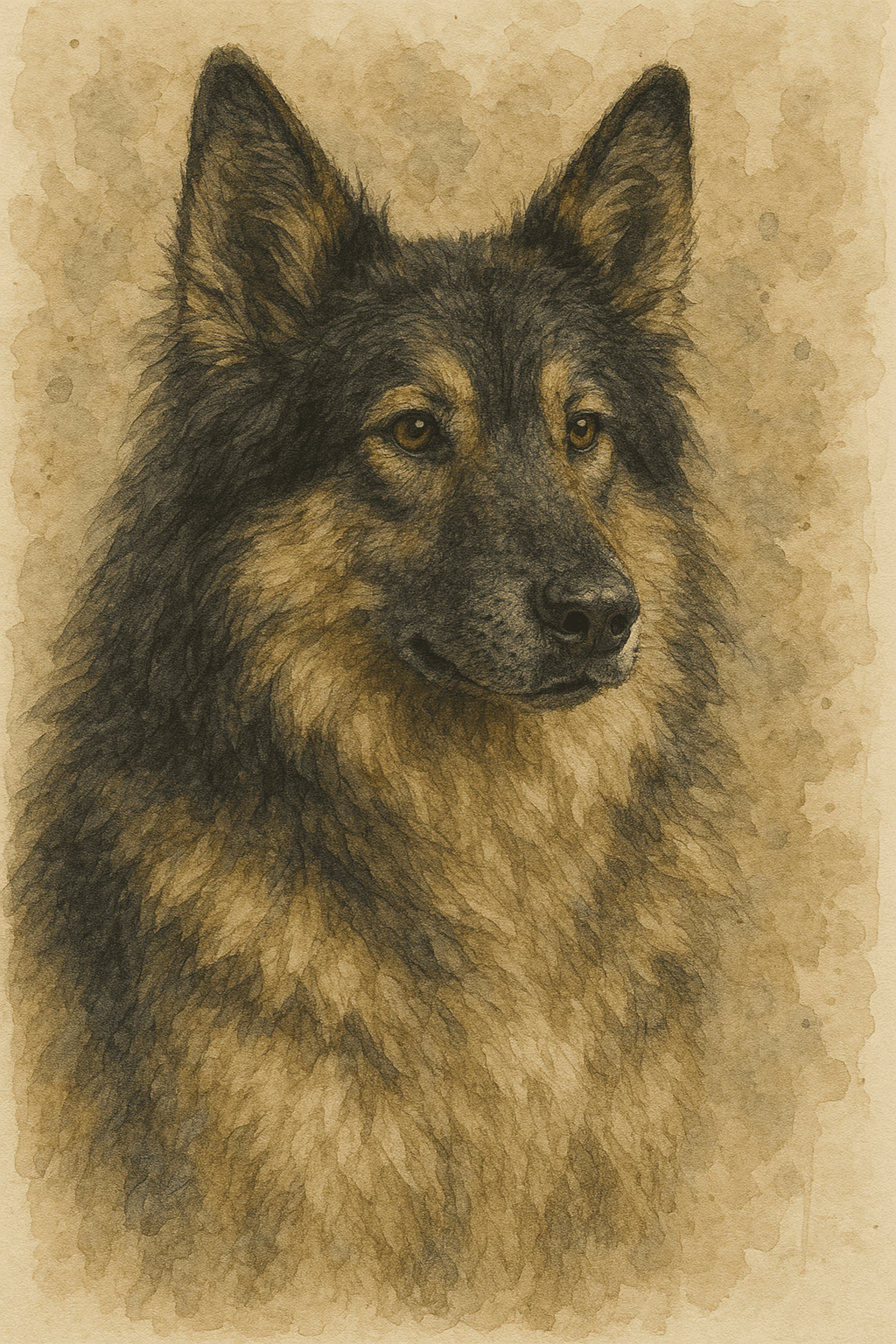
A Sacred Bond:
Dogs and the Southeastern People
Long before colonization, our ancestors had an unbroken relationship with the natural world. Dogs lived freely among the people, but they were no less bonded than any family member. They stood watch outside the homes. They followed the children through the woods. They accompanied hunters, comforted elders, and slept close to the fire.
Among the Southeastern tribes, dogs had spiritual roles, not just physical ones. They were messengers and protectors. They could sense danger long before it arrived. Some were even believed to carry omens, warnings, or healing dreams.
When a medicine person or elder recognized a dog as having a spiritual assignment, that dog was honored. It was not owned, but partnered with.
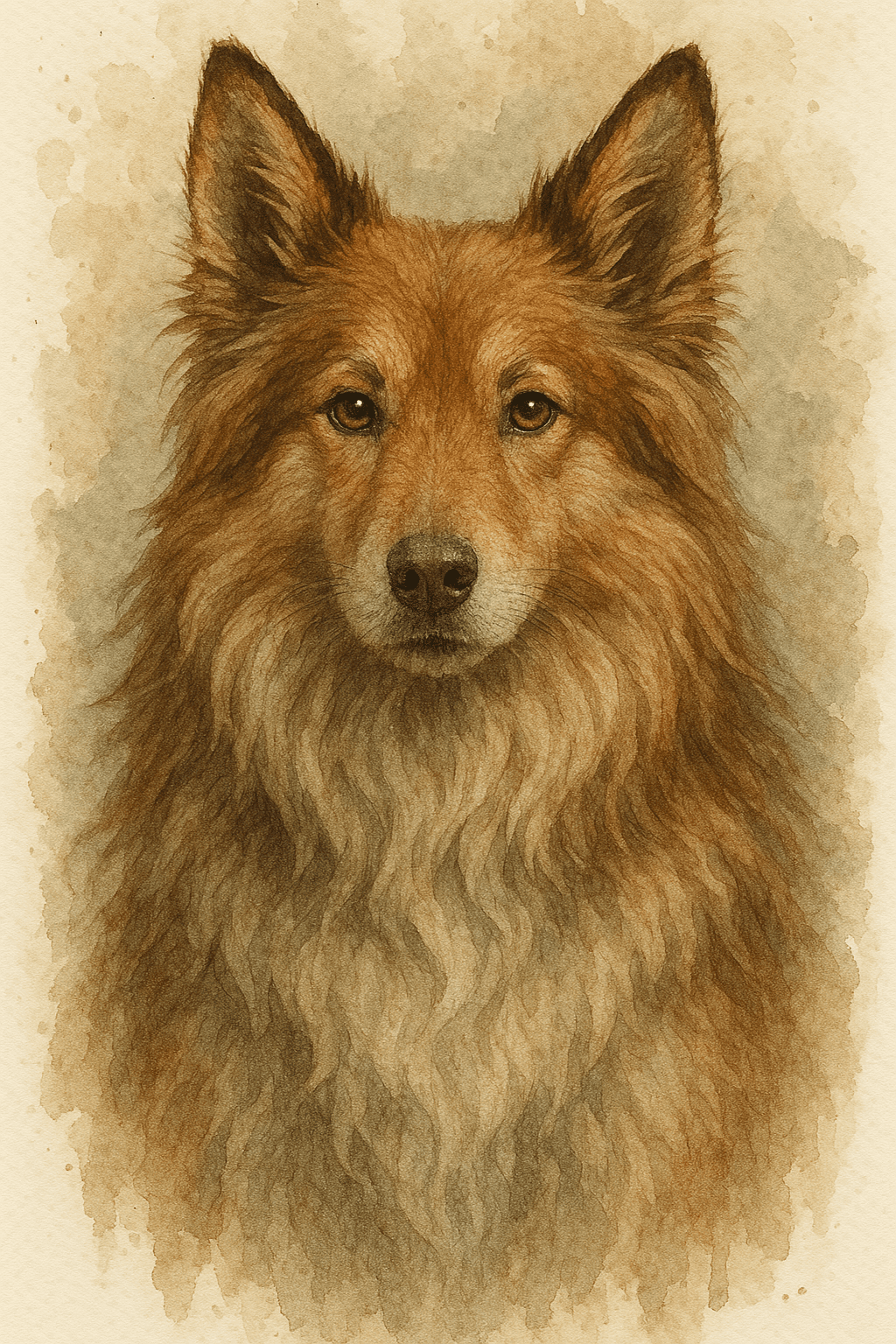
The Role of the Medicine Dog in the Modern World
Today, we live in a world full of noise, stress, sickness, and disconnection. People are more anxious, more depressed, and more isolated than ever. Many have lost touch with the sacred. But the medicine is still here — and some of it still walks on four legs.
A medicine dog in today’s world still carries out its ancient assignment: to bring balance and healing where it is needed. But the way it does so may look different. A medicine dog may come to a veteran with PTSD. A child with sensory issues. A family that has lost its center. A woman recovering from trauma. The dog doesn’t need to be trained to diagnose or fix these things — its gift is presence. Grounding. Energy. Sacred attention.
In our belief, every medicine dog has an assignment — a reason they are here. And part of our role at Corn Moon Medicine Dogs is to guide them spiritually to that assignment. We do not select their purpose. We help them discover it. This is not just matchmaking. This is spiritual work.
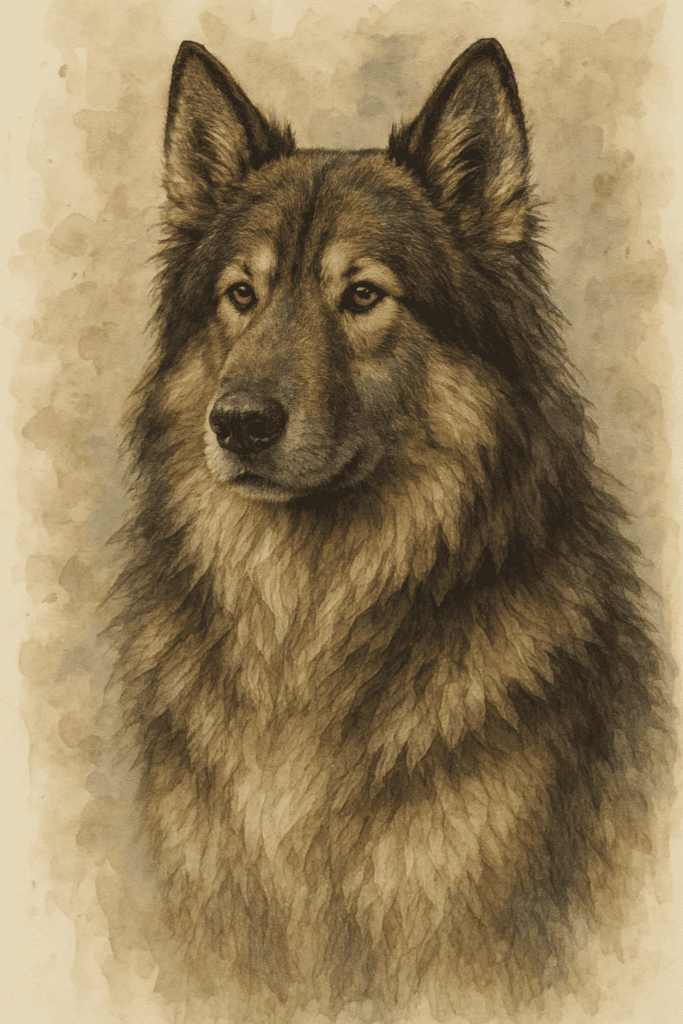
The Naming Ceremony: Receiving of the Medicine
When one of our dogs is ready for their assignment, they receive a name. But not just any name — a sacred name, revealed through prayer, intuition, and guidance. In our tradition, a name is not a label. It is a gift. It is medicine.
The naming ceremony is a pivotal moment in a medicine dog’s journey. The name they are given carries meaning and power that will not only shape their role, but also become part of the healing they bring into a home. That name is spoken over them, breathed into their story, and shared with the family they are called to serve.
Each family who receives a medicine dog receives not just an animal, but a living prayer. The dog brings with it a medicine that cannot be bought, taught, or replicated — only carried, and only received.
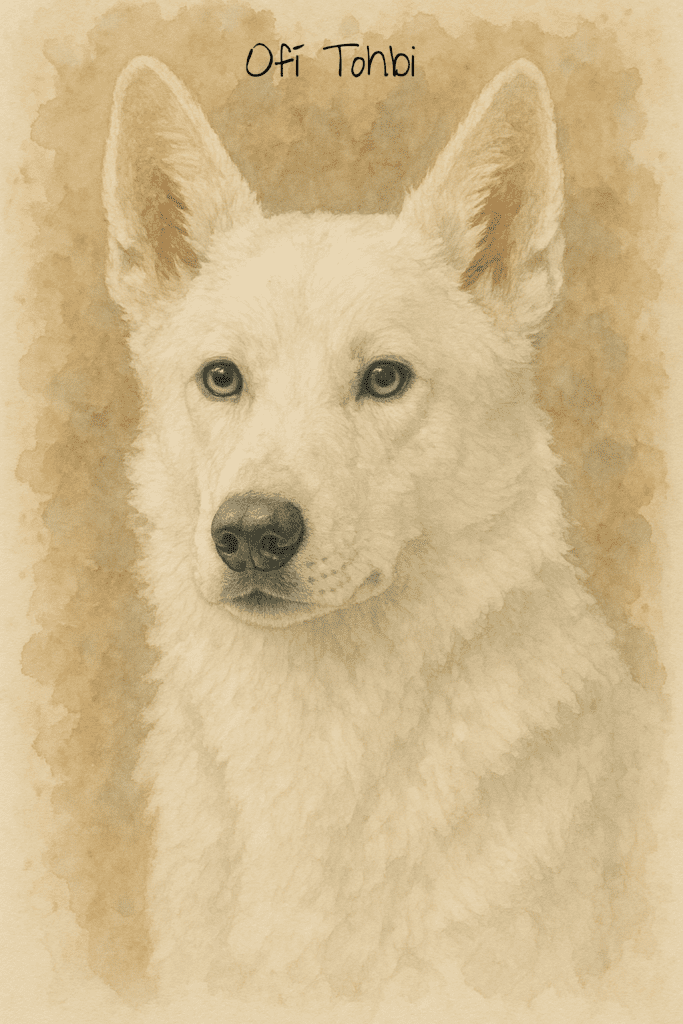
Ofí Tohbi: The First Medicine Dog
Among the Choctaw people, Ofí Tohbi — meaning “white dog” — holds a place of reverence, mystery, and enduring spiritual power. This sacred figure is more than just a memory of an ancient companion; it is a living symbol of purity, loyalty, protection, and guidance.
Ancestral Companion
Long before colonization disrupted our lifeways, the Choctaw lived closely with the land and the beings who shared it. Among these were our dogs — free-roaming yet bonded, deeply loyal, intelligent, and attuned to the rhythms of tribal life. Ofí Tohbi was said to be one of these dogs: a white-coated companion who walked beside our ancestors through village life, hunts, and migrations.
Accounts describe the Choctaw dog as medium to large in size, strong, and capable of assisting in the daily responsibilities of community life. The white-coated dog, Ofí Tohbi, stood apart — not just because of its striking appearance, but because of the spiritual role it played in stories passed down through generations.
Spirit Guardian and Guide
Oral tradition holds that Ofí Tohbi was not always of this world. In times of danger, uncertainty, or loss, a white dog would appear on the path ahead — silent, watchful, and calm — leading the way to safety or awakening a warning to turn back. Then, just as suddenly as it came, it would disappear.
To many Choctaw elders, this was no ordinary animal. Ofí Tohbi was a spirit being, a messenger, or a guardian sent by the Creator to protect the people. For this reason, the white dog became associated with spiritual purity, divine guidance, and sacred companionship.
Symbol of Loyalty and Truth
Choctaw people view dogs not simply as animals, but as relatives — protectors, partners, and spiritual kin. Ofí Tohbi reminds us that truth walks with those who are loyal, and that even in darkness, the Creator sends signs to guide us home.
Some families would bury their dogs with honor, offering them a place beside the people they had faithfully protected. Stories were told by the firelight of the dog who could see beyond this world, who warned of danger, who waited in silence for a traveler who had lost their way.
A Living Legacy
Though the Ofí Tohbi of legend may no longer walk beside us in body, the spirit of this sacred companion endures in the hearts of our people — and perhaps even in the dogs who continue to walk with us today. Preservation efforts like the Native American Indian Dog seek to honor the memory and physical traits of our ancient village dogs, but the deeper legacy of Ofí Tohbi lies in what it teaches: to walk in trust, to love fiercely, and to listen when Spirit speaks.
May the white dog watch over your path and walk beside you always. Yakoke (thank you) for remembering.
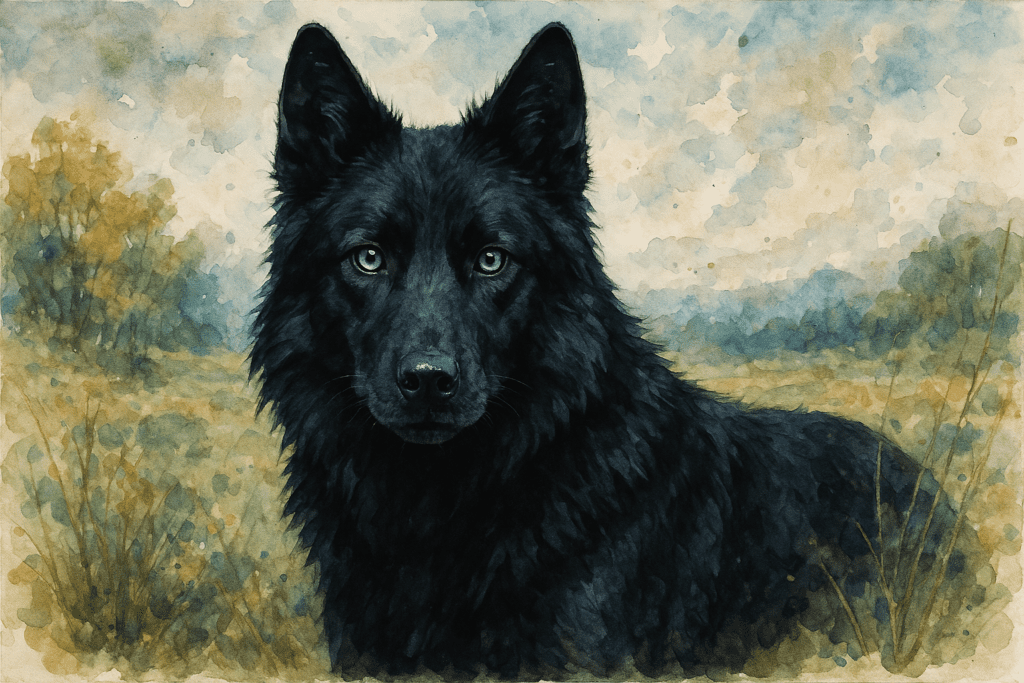
Why the World Needs Medicine Dogs Now
This world is in crisis — not only physically, but spiritually. People are more disconnected from the land, their ancestors, their bodies, and their purpose than ever before. Medicine dogs are one of the Creator’s answers to this crisis.
They bring us back to center. They make us slow down. They see through the masks and distractions and meet us where we are. They are not broken by our pain — they move toward it. And in doing so, they help us heal it.
Corn Moon Medicine Dogs exists to protect, preserve, and carry forward this sacred bond between dog and human — between spirit and purpose. We believe that the old ways are not lost. They are waiting — in the hearts of the dogs, and in the hearts of the people ready to receive them.
When the medicine is ready, the dog will come. And when the dog comes, the healing begins.
Are You in Need of the Medicine
Only a Native American Indian Dog Can Carry?
Apply for a Puppy From Our ProgramTo protect and preserve with utmost spirit and integrity the authentic, original Native American Indian Dog.
